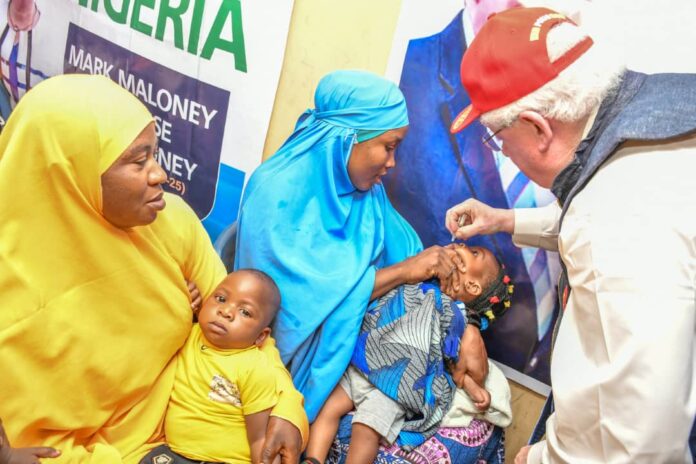Chairman of the Board of Trustees, Rotary International Foundation/former President of Rotary International, Mark Moloney, administrating a vaccine as a symbolic polio immunization, held at Primary healthcare Jahi Village Ndawuse, in Abuja yesterday.
Rotary International says it has invested over $300 million in Nigeria to combat polio since it initiated global immunization efforts. This was disclosed Mark Maloney, Chair of the Rotary International Foundation
Maloney who is the first Chair of the Rotary Foundation to visit Nigeria to assess the organization’s ongoing efforts, also expressed his admiration for the impact of Rotary International’s maternal and child health intervention through a $2 million Program of Scale grant to Nigeria
While speaking on Thursday in Abuja at the Jahi Primary Health Center, alongside his wife, Gay and other Rotary officials, after administering immunizations and presenting souvenirs to children, Maloney reaffirmed Rotary International’s unwavering commitment to eradicating polio in Nigeria and assured that the country is well-positioned to receive further grants from the organization.
Maloney’s assurance comes in light of the ongoing challenge posed by variant poliovirus type 2, despite the country being declared polio-free in 2020, emphasizing the critical need for sustained government focus, akin to the successful eradication of the wild poliovirus.
“Rotary can only do so much as a private organization. We encourage the Nigerian government to redouble its efforts to eliminate variant polio completely, freeing its health programs to tackle other pressing issues,” he said.
While explaining that the exact allocation for 2025 remains undecided, Maloney estimated a significant tranche of funding could be approved during upcoming meetings, despite the pressing needs in countries like Pakistan and Afghanistan where wild polio remains endemic.
“There’s $50 million that I expect will be allocated at that meeting, but a lot of it has to go to Pakistan and Afghanistan where the wild poliovirus is still endemic, but I think there will be a significant tranche of funds, maybe not tens of millions, I don’t think it will be that big, but a significant amount of money allocated to Nigeria,” he said.
In addition to its polio eradication efforts, Rotary International is addressing maternal and child health through a $2 million Program of Scale grant.
The initiative, titled “Healthy Families in Nigeria,” aims to reduce maternal and infant mortality by increasing the number of births in healthcare facilities.
Maloney expressed his impression of the work Rotary in Nigeria has been doing, citing a district where facility-based births rose from 11% to 33% within the program’s first year.
“Though it is too early to measure the impact on mortality rates, the upward trend in medical facility usage indicates progress”.
After symbolically administering the polio vaccine to children alongside his wife, Gay, Maloney is scheduled to hold a town hall meeting with Rotarians from across Nigeria, followed by a dinner in his honor, before continuing his visit to the country with a stop in Lagos.
After symbolically administering the polio vaccine to children alongside his wife, May, Mark Maloney is set to hold a town hall meeting with Rotarians from across Nigeria followed by a dinner in his honour before proceeding to Lagos to continue his visit to the country.
Joshua Hassan, past District Governor and the Chairman of the Nigeria National Polio Plus Committee, said 92 cases of the variant poliovirus type 2 have been reported as of December 2024
According to him, the cases are concentrated in Northwestern states, particularly Kano, Zamfara, Katsina, Kebbi, and Sokoto.
Hassan likened the persistence of the variant poliovirus to the way mutations occurred during the COVID-19 pandemic, emphasizing the necessity of rapid outbreak responses.
Stressing that Rotary Nigeria is committed to the eradication of the variant like it did the wild poliovirus, Hassan said, “These cases are vaccine-derived or variant strains, and they predominantly affect the northwest region. Our strategy involves swift immunizations to contain and prevent further spread”.




